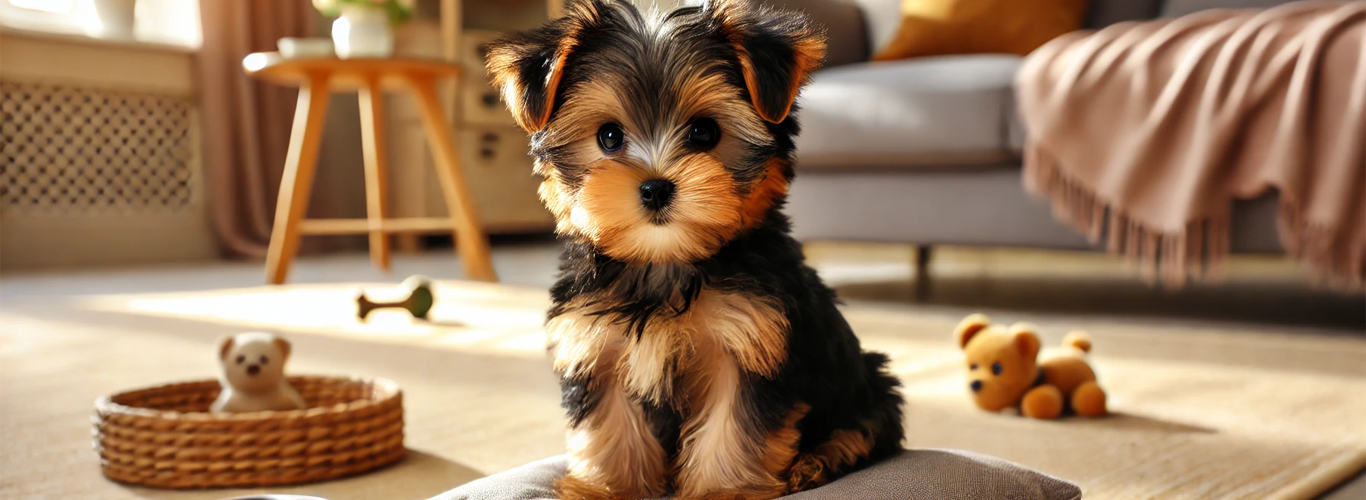Bringing a Yorkshire Terrier puppy into your home is an exciting and rewarding experience. These tiny, energetic dogs are full of personality, but they also require special care to ensure they grow into happy, healthy adults. In this guide, we’ll cover everything you need to know about caring for your Yorkshire Terrier puppy, from feeding and grooming to training and health care.
Preparing Your Home for a Yorkshire Terrier Puppy
Before bringing your puppy home, it’s important to create a safe environment. Yorkshire Terriers are small and fragile, so take these precautions:
- Remove small objects that could be swallowed.
- Secure electrical cords to prevent chewing.
- Block off dangerous areas like staircases or balconies.
- Provide a comfortable bed in a quiet area.
- Buy essential supplies such as food bowls, a soft harness, a leash, and toys.
Feeding Your Yorkshire Terrier Puppy
Proper nutrition is essential for your puppy’s growth. Here’s what you need to know:
Best Food for a Yorkie Puppy
- Choose a high-quality puppy food designed for small breeds.
- Look for foods with real meat as the first ingredient.
- Avoid fillers like corn and wheat, which can cause allergies.
How Often to Feed a Yorkie Puppy
- 8–12 weeks old: 4 meals per day.
- 3–6 months old: 3 meals per day.
- 6–12 months old: 2 meals per day.
Can Yorkie Puppies Eat Human Food?
Some human foods are safe, while others can be dangerous:
Safe: Cooked chicken, carrots, blueberries, apples (no seeds).
Avoid: Chocolate, onions, garlic, grapes, and fatty foods.
Grooming and Hygiene
Yorkshire Terriers have a beautiful, silky coat that requires regular care.
Brushing and Bathing
- Brush your puppy daily with a soft-bristle brush to prevent tangles.
- Bathe your Yorkie every 2–4 weeks with a gentle puppy shampoo.
- Dry thoroughly to prevent chills.
Nail Trimming and Ear Cleaning
- Trim nails every 2–3 weeks to avoid painful overgrowth.
- Clean ears weekly to prevent infections.
Dental Care
Yorkies are prone to dental problems, so start a routine early:
- Brush their teeth daily with dog-safe toothpaste.
- Provide dental chews to help reduce plaque.
House Training and Socialization
Training should start from day one to ensure good behavior.
Potty Training
- Take your puppy outside every 2–3 hours.
- Reward with treats and praise after successful potty breaks.
- Use puppy pads indoors as a backup.
Socializing Your Puppy
- Introduce your Yorkie to different people and pets early on.
- Expose them to various environments and sounds to build confidence.
- Use positive reinforcement to encourage good behavior.
Exercise and Mental Stimulation
Despite their small size, Yorkshire Terriers are energetic and need regular activity.
Physical Exercise
- Short walks (15–20 minutes) twice a day.
- Indoor playtime with toys and interactive games.
Mental Stimulation
- Provide puzzle toys to challenge their intelligence.
- Teach new commands and tricks to keep them engaged.
Common Health Issues in Yorkie Puppies
Yorkshire Terriers are generally healthy but can be prone to some issues:
Hypoglycemia (Low Blood Sugar)
- Common in small breeds.
- Symptoms: Weakness, tremors, lethargy.
- Solution: Feed small meals regularly and provide a sugar boost (like honey) if needed.
Luxating Patella (Kneecap Dislocation)
- A genetic condition affecting their knees.
- Prevent by avoiding excessive jumping and ensuring a healthy weight.
Tracheal Collapse
- Yorkies have delicate windpipes.
- Avoid using a collar; use a soft harness instead.
Dental Disease
- Due to their tiny mouths, Yorkies often suffer from tooth decay and gum disease.
- Regular dental care is crucial.
Veterinary Care and Vaccinations
Regular vet check-ups are essential for your Yorkie’s health.
Vaccination Schedule
- 6–8 weeks: First vaccinations (Distemper, Parvovirus).
- 10–12 weeks: Second round of vaccines.
- 16 weeks: Rabies vaccine.
- Annual boosters to maintain immunity.
Deworming and Flea Prevention
- Start deworming at 2 weeks old and continue monthly as needed.
- Use flea prevention recommended by your vet.
Final Thoughts: Giving Your Yorkie Puppy the Best Start
Raising a Yorkshire Terrier puppy requires time, patience, and love. With proper care, training, and attention, your Yorkie will grow into a happy and well-behaved companion.
Do you have any specific concerns about your Yorkie puppy? Let us know in the comments! 🐶💙





